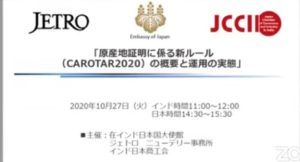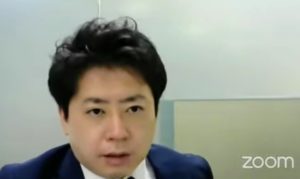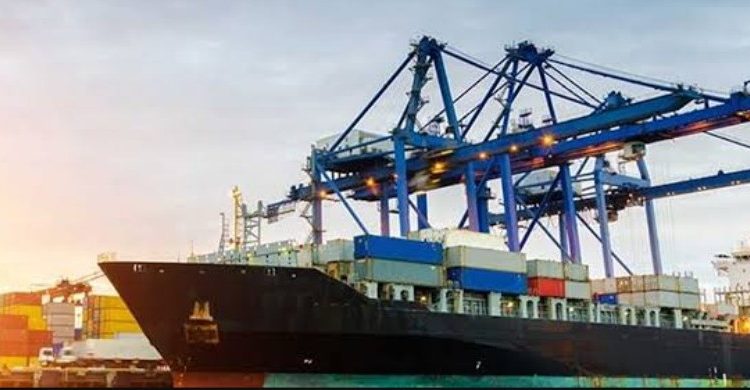Over 600 Japanese Cos. show up with issues related to new Customs Rules of Origin under CAROTAR 2020
Companies are facing issues like delayed shipments, broken supply chain, mounting demurrage charges, increasing cost of operations, loss of production, as well as the out-of-stock situation.
NEW DELHI: The mandatory declaration of country of origin, as well as cost of components of imported goods by the importers under newly implemented Rules of Origin, have emerged as a cause of serious concern among various nations especially the countries with which India has entered into Foreign Trade Agreement (FTA) such as Japan, South Korea, and ASEAN.
Implemented on September 21 this year, the Customs (Administration of Rules of Origin under Trade Agreements) Rules, 2020 (CAROTAR 2020) procedures have resulted in delayed shipments, broken supply chain, mounting demurrage charges, increasing cost of operations, loss of production, as well as the out-of-stock situation.
However, the companies are compelled to skip the advantage like a lower rate of customs charges available under FTA, and are paying normal customs rates to honour their orders to their clients, thus incurring the additional cost of productions.
All such problems came to the fore during a webinar conducted jointly by the Embassy of Japan in India, Japan External Trade Organization (JETRO), and Japan Chamber of Commerce and Industry in India (JCCII) on October 27, the Tuesday.
More than 600 Japanese companies turned up during the webinar which is a clear indication of the severity of the problems related to the implementation of the provisions of new Rules of Origin laid under CAROTAR 2020.
JETRO was represented by Yasuyuki Murahashi, Chief Director-General, and Japan embassy by Yuichi Koshikawa, Second Secretary, Economic Section.

According to JETRO Chief DG India entered into Foreign Trade Agreement with countries like Japan and other ASEAN countries for extending the benefit of low custom charges to them and it was good for promoting bilateral business. But the new Rules of Origin (CAROTAR 2020) is creating new problems for the companies at the port level.
“If the customs officials had followed the conditions specified in the CAROTAR 2020, there would have been no problem but unfortunately, they are going overboard, and are demanding information over and above of what is mentioned in the Rules,” said Yasuyuki Murahashi.
He said that it was extremely difficult for the companies importing goods to get all information from the country of origin because of the confidentiality factor on the part of the exporter. But importers are sharing all the information which they can get from the other side but custom officials are asking for more details such as the cost of components etc.
Related article: New Rules of Origin against the spirit of FTA and EPA towards the world; might hinder FDI, ODA from Japan
And this situation is also giving rise to corruption at the ports. Now the situation has come to such a level that companies are more dependent on the customs officials.
Already reeling under the effect of the COVID-19-induced lockdown resulting in a slowdown, the business has further been hit by the CAROTAR2020.
 While counting on the negative effects of CAROTAR 2020 on the trade, Yasuyuki Murahashi said the new Rules of Origin has resulted in the delayed supply of material, broken supply chain, mounting demurrage charges, increasing cost of operations, loss of production, and resulting in the out-of-stock situation for the companies wanting to take advantage like preferential rate of customs charges available under FTA.
While counting on the negative effects of CAROTAR 2020 on the trade, Yasuyuki Murahashi said the new Rules of Origin has resulted in the delayed supply of material, broken supply chain, mounting demurrage charges, increasing cost of operations, loss of production, and resulting in the out-of-stock situation for the companies wanting to take advantage like preferential rate of customs charges available under FTA.
“Negotiations with the customs officials are taking a longer time than earlier and that is what is affecting the clearances of the imported goods, and shipments are getting delayed resulting in loss of revenue as well as business to many companies,” he added.
In his address to the participating Japanese companies Yuichi Koshikawa, Second Secretary, Economic Section, Embassy of Japan, New Delhi said that the webinar was organized to address the problems being faced by Japanese companies in India with regard to adherence to new Rules of Origin (CAROTAR 2020), and also to offer them solutions.

“During the webinar, we took up some specific problems raised by Japanese companies. We were told that the importer companies were not able to procure the confidential information from the country of origin as was asked by the Customs department, and they faced problems in getting customs clearances, and shipments of the imported goods were stuck at the ports. In such cases, the customs department could get necessary information through verification to the authority of the exporting country,” said Yuichi Koshikawa.
However, not to delay the production process and honour timely delivery of finished goods to their clients, Japanese companies are compelled to pay normal custom duties to get timely customs clearances. In the process, these companies are not able to avail of the benefit of preferential or concessional rate of customs duty available to them under FTA, and they pay a differential amount of duties.
Related article: New Rules of Origin for imports under FTA evoke sharp response; Raise concerns
“We are not against to the new Rules of Origin as there are always issues related to the implementation of rules at the initial stages, and Japanese companies are fully cooperating to make sure the Indian economy doesn’t get affected, and hope that new rule would not be an obstacle to the ease of doing business. Earlier there was a huge amount of confusion in terms of the Rules of Origin but after CBIC came out with detailed FAQs on October 8, the confusion has reduced considerably since then,” Yuichi Koshikawa added.
While explaining the major points discussed during the webinar, Yuichi Koshikawa advised the participating companies to show their due diligence procedures under the provisions of CAROTAR 2020 while importing goods into India, and check FAQs carefully.
Second, the companies were advised to file the Form – I with the basic information at the earliest time from a request of the customs authority, and also clearly mention the information they could not get from the other companies as soon as possible, he added.



